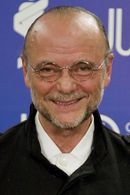Moses Znaimer, a renowned broadcasting pioneer, was born in 1942 in Kulab, Tajikistan, a former Soviet Republic. Due to the tumultuous times of World War II, his family fled to Shanghai, and eventually settled in Montreal, Quebec, Canada.
Znaimer's educational background is marked by his BA in philosophy and politics from McGill University, as well as his MA in government from Harvard University. He began his broadcasting career at the Canadian Broadcasting Corporation (CBC) in 1965, where he directed, produced, and hosted several shows until 1969.
Znaimer's entrepreneurial spirit led him to leave the CBC and launch his own private broadcasting venture in 1969. With the absence of VHF licenses in Toronto, he founded CITY, Channel 79 (later 57),the city's first UHF channel, in 1972. CITY's unique programming approach, which would become a hallmark of his broadcasting style, has had a profound influence on the industry and has been felt worldwide.
The success of CITY prompted CHUM, a Toronto-based media conglomerate, to purchase the station in 1981. With a significant increase in budget, Znaimer went on to found several other television stations, including MuchMusic in 1984, Canada's first 24-hour music station. This innovative concept was later replicated with MusiquePlus, a French-language station, in 1986.
Since the 1980s, Znaimer has been instrumental in shaping the face of Canadian television, launching or directing over two dozen television stations in Canada and around the world. His broadcasting philosophy, which emphasizes a "Participatory, Interactive, Storefront, Studioless, Television Operating System," sets CHUM-CITY stations apart from traditional media sources.
Throughout his career, Znaimer has consistently strived to create television that reflects the diverse cultural, ethnic, and personal perspectives of its viewers. Each of his stations has made a concerted effort to incorporate a wide range of programs and personalities, making them a true reflection of the communities they serve.
























